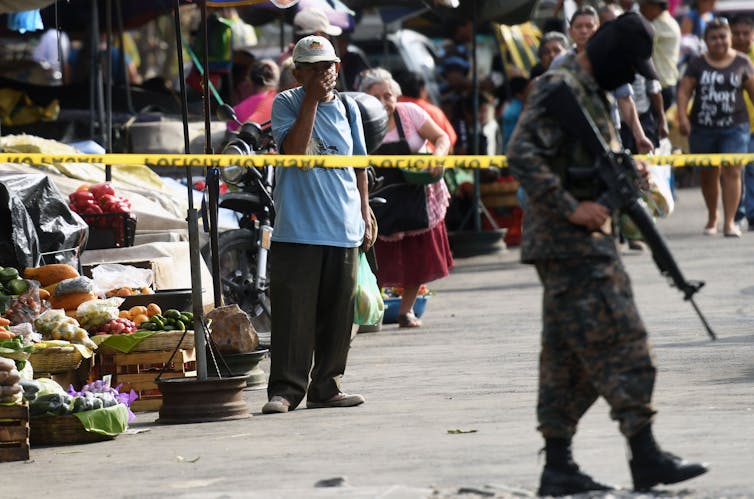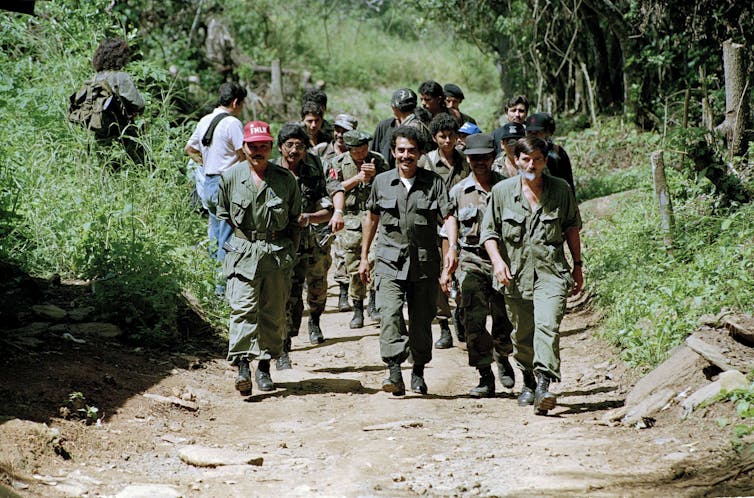
By Mneesha Gellman
The Conversation
At least 138 people deported from the United States to El Salvador since 2013 have been killed, according to a new report by Human Rights Watch, which investigates human rights abuses worldwide.
The 117-page report also says researchers identified at least 70 deportees who were sexually assaulted, tortured or kidnapped. Many victims were asylum-seekers attacked or killed by the gangs they originally fled.
The findings show that “the U.S. is repeatedly violating its obligations to protect Salvadorans from return to serious risk of harm,” Human Rights Watch says.
The group used court records, police reports, interviews with victims and their families and news articles to document the fates of deportees. It is the first systematic effort to find out what happened to Salvadorans whose asylum claims were rejected in U.S. immigration courts because they failed to demonstrate “credible fear” of violence in El Salvador.
International asylum laws created after the Holocaust require countries to take in people who are persecuted for their race, religion, nationality, membership of a particular social group or political opinion.
El Salvador has one of the world’s highest homicide rates. It is one of the main sources of migration to the U.S.
As part of its immigration crackdown, the Trump administration in September signed an agreement with El Salvador requiring the Central American country to keep asylum seekers there while they await the results of their asylum claims.
But the murders of 138 deportees belie any notion that El Salvador can protect citizens who are under threat.
Roots of Impunity
Roughly the size of New Jersey, El Salvador is densely populated and highly connected by cellphone service and social media. The vulnerable groups protected under international asylum law cannot easily go under the radar or relocate if targeted by gangs, corrupt police or domestic abusers.
Hundreds of Salvadorans are killed every month. Murders, disappearances and tortures almost always go unsolved in El Salvador. Criminals, especially those with access to power, are rarely punished for their wrongdoing.
I have documented this culture of impunity across Central America and Mexico, focusing on the indigenous people, women and political dissidents who are so often victims of political violence.
This violence dates back centuries, to Spain’s bloody conquest of the Americas. As in the U.S., colonial-era brutality has lasting impacts on the region’s race, class and gender divisions.
In 1932, the massacre of indigenous Salvadorans and leftists who rebelled against dictator Maximiliano Hernández Martínez left between 10,000 and 30,000 dead.
Communist Party member Farabundo Martí, who led Salvadoran peasant farmers in their revolt against political corruption and unjust resource allocation, was assassinated after the massacre. But the struggle continued.
By the 1970s, dissident factions again organized against state oppression. United as the Farabundo Martí National Liberation Front, these groups eventually waged war on the ruling ARENA party, which they blamed for oppressing the Salvadoran working class.
The subsequent Salvadoran civil war killed 75,000 people. In 1992, with intensive military support from the United States, ARENA defeated the rebels.
The 1992 El Salvador peace accords, overseen by the United Nations, were meant to bring national reconciliation. A truth commission documented widespread human rights abuses committed by state and paramilitary forces during the war. But days after the report was released, in 1993, El Salvador’s ARENA-controlled congress passed an amnesty law that excused most government and military officials.

As a result, the root causes of El Salvador’s conflict – particularly, unequal access to insufficient resources – still plague society. So does the very weak rule of law that allowed civil war criminals to go unpunished.
Neither the rightist or leftist governments that have held power since have managed to change this.
El Salvador’s defense minister recently assessed that there are more gang members than soldiers in his country. Police in El Salvador are extremely aggressive in pursuing them, and civilians can get caught in the crossfire, Human Rights Watch finds.
The resulting dangerous disarray sent 46,800 residents to seek asylum in the U.S. last year. Risking the unknown violence of migration over guaranteed violence at home is, for many Salvadorans, a logical decision.
Human Security
Crime and violence in El Salvador has declined since President Nayib Bukele took office in June 2019, according to the government.
The president credits his tough-on-gangs policing with improving security in the country. But some crime analysts say the apparent drop in homicides is actually a manipulation of crime data. The government recently changed how it counts murders, eliminating deaths that result from confrontation with security forces – police killings – from the homicide category.
In any case, levels of violence in El Salvador are still among the world’s highest.
Police regularly turn a blind eye to violence by gang members, including both MS-13 and Barrio 18 gangs, either due to corruption or concern for their own safety. As a result, Salvadoran police frequently fail to meaningfully protect people from gang violence.
In these circumstances, deporting Salvadoran asylum-seekers may violate an international law called “non-refoulement.”
According to the 1954 United Nations Convention on the Status of Refugees, which both the U.S. and El Salvador signed, states cannot expel refugees to a territory “where his life or freedom would be threatened.”
Migrants know El Salvador can’t protect them. That, of course, is why they flee. Now the United States government has to know that, too.
Mneesha Gellman is associate professor of political science at Emerson College.
This article is republished from The Conversation under a Creative Commons license. Read the original article.
Please Donate to Consortium News.
Before commenting please read Robert Parry’s Comment Policy. Allegations unsupported by facts, gross or misleading factual errors and ad hominem attacks, and abusive or rude language toward other commenters or our writers will not be published. If your comment does not immediately appear, please be patient as it is manually reviewed. For security reasons, please refrain from inserting links in your comments, which should not be longer than 300 words.

The School of the Americas was established in 1946. Since then nearly 60,000 Latin American officers have been trained and graduated from the school. In 2000 the name was changed after pressure from congress that they would with hold funding initiated a name change to the Western Hemisphere Institute for security Cooperation WHISC or WHINSEC. See the Wiki.
The CIA in cooperation NSA have undermined any government, many democratically elected, that did obey the edicts of the US.
As always, professional U.S. military needed some thing to keep them sharp/busy and during the seventies as the illegal drug economies blossomed the U.S. military became heavily involved supposedly stamping ut the drug trade which culminated in CIA drug ruinnning envolvement during the 1980’s..
Now the U.S. is back down there stirring the pot.
The US bipartisan solution to Latin American issues is to steal their resources, set up a right-wing dictator and government to guard US interests, and to turn the nations of interest into narco states where the gangs/ cartels terrorize the people and distract them from the corruption and theft. This has produced a steady stream of illegal immigrants for cheap exploitable labor bringing their values to the US (some good, some– like their more than ten-fold homicide rate– bad). These people once in the US are essentially slaves and their employers, using them as slaughterhouses workers, domestic servants, construction workers, landscapers, sweatshop workers, etc, always rationalize by saying they will do jobs that Americans won’t (of course at half pay) and they are better off here than in their own countries. As Schwarzenegger’s “love child” shows, the exploitation is not just in wages.
These kids grew up under Iran/Contra. All they know is violence. Reagan/Bush should have gone to prison, except Bush pardoned everyone (including Reagan) when he became President. War Criminals.
I’m all for protecting our borders and for tight labor markets. HOWEVER, this is a classic case of U.S. economic imperialism and outright militarist imperialism turning a Central American state into a violent cesspool.
Before we can seriously talk about enforcing our borders we must first have a serious discussion about the Washington imposed exploitation many of these underdogs are fleeing.
I agree, but if one was to follow the trail of Pirate America—just look f0r the current popular resources that the pirates need. Yes, oil of course, but now it’s lithium——and down goes yet another nation.
The authoress claims that “This violence dates back centuries, to Spain’s bloody conquest of the Americas.” I think that’s a rather broad generalization. I visited Honduras in 1980, and it was a very safe and peaceful country, unlike Guatemala.
As Reagan (that a**hole) said San Salvador is closer to Houston than Washington, dc.